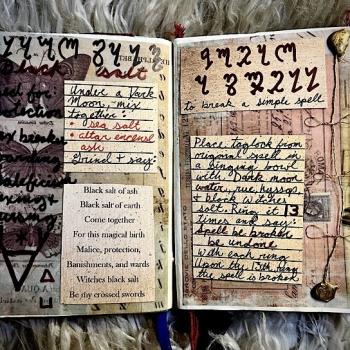The least offensive thing on television as I sit down to write, my belly full of my roommates cat-head biscuits and sausage gravy, is The Song of Bernadette. So of course I’m listening to Jennifer Warnes singing Song for Bernadette. Maybe the song and film will bring me some kindness as I write today’s post, which is a topic that can too quickly become harsh and unkind.

I spend a significant number of my waking hours considering the Pagan community, it’s limitless diversity, identifying trends and devising useful categorizations. Not merely as an objective exercise, but also in an attempt to better understand myself and where I stand within the modern religious landscape. As I’ve given this thought I’ve come to realize there is a very basic division in Paganism, and for this post I’m going to characterize it as the difference between polytheists and Neo-Pagans. I’m likely using these terms differently from most people for the purpose of this post, so I’ll begin by defining them, and by affirming that both groups are firmly part of the Pagan community.
Neo-Pagans
- Neo-Pagans find the symbols, stories and Gods of ancient paganism inspiring, but use them within a mostly modern context.
- Neo-Pagans largely reject organized religion.
- Neo-Pagans eschew anything that might resemble an Abrahamic religious concept or practice.
- Neo-Pagans prefer spirituality to religion.
- Neo-Pagans base the foundation of their practice on Jungian and Campbell’s theories on psychology, archetype and myth; on feminism and feminist spirituality; on New Thought and/or New Age theories; on ecology and nature-based spirituality.
- Neo-Pagans focus on the intensely personal and broadly communal (i.e. personal spiritual development, healing for all humankind).
- Neo-Pagans are more interested in creating new spiritual paths than in reviving the religions of the past.
Polytheists
- Polytheists find the symbols, stories and Gods of ancient paganism to be best understood in their original context, and only adapted to modern life upon careful reflection.
- Polytheists have less animosity towards organized religion.
- Polytheists evaluate Pagan practices and concepts on their own merits, regardless whether or not Abrahamics have adopted them.
- Polytheists are more likely to embrace the concept of religion and all it encompasses.
- Polytheists base the foundation of their practice on historical paganism.
- Polytheists focus on families and/or small communities first, and the individual secondly. Very rarely is the focus on humanity at-large.
- Polytheists are more interested in reviving old forms of religion than in modern spiritual practices.
I want to stress that I see both of these groups as doing good and fine work within the Pagan community. Neither is better than the other. Yet these significant differences result in crossed-wires, and occasionally rudeness. The point of this post is not to be unnecessarily divisive, but to point out the very real differences already existing in our communities in order to foster better understanding and communication.
The are undoubtedly more Neo-Pagans than polytheists, and although the polytheists are growing fast they will likely never outnumber Neo-Pagans. Trends in the larger religious sphere reflect that same ratio as the spiritual outnumber the religious and keep gaining momentum. This is also why Progressive Christians, New Agers and “spiritual but not religious” people tend to have a lot of overlap with Neo-Pagans. Polytheists tend to have more in common with Hindus, and possibly Reform Jews, than any other religious group. The steady rise of polytheists in our communities, against the macro trend, is a fascinating development.
As for me, I am stuck with a foot in each camp. As an initiated trad Wiccan, I am a Neo-Pagan and find worth in that. As someone who rejects monism, transcendence and monotheism, and who is intensely interested in reviving ancient religion, I am a polytheist. Now that I lack a coven, I in truth probably lean more towards polytheism at this point in time.
What concerns me is what this set of differences mean. My personal preference is that we recognize each other’s differences and support each other as the spiritual siblings we are, but I also have to wonder if this difference is necessary? History shows us that those with spiritual and religious differences tend to thrive once divided, and perhaps the only way for each of these groups of Pagans to truly thrive is to disentangle themselves from each other?















